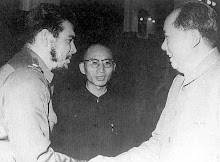News Analysis:
How far will U.S. go in Mideast peace mission?
20 April, 2009
by Xinhua writer Zhu Lei
CAIRO, April 19 (Xinhua) -- U.S. Middle East envoy George
Mitchell did not find welcoming ears this time in nudging
new Israeli leaders to accept that a Palestinian state
alongside Israel is the only way to end the Mideast
conflict.
During his third trip to the region since nominated by U.S.
President Barack Obama late January, Mitchell spared no
efforts in advocating the two-state solution in solving the
decades-old conflict.
But Mitchell's first meetings with top leaders of the new
Israeli government since it was sworn in on March 31
highlighted the split between the U.S. and Israeli peace
policy with the Palestinians.
The traditionally hawkish Israeli premier Benjamin
Netanyahu, who has paid little lip service to the peace
plan since assuming power, said in a statement that the
creation of a Palestinian state at the current stage is
premature and would play into the hands of Gaza Hamas
rulers.
He also conditioned the start of talks on the two-state
solution on Palestinian recognition of Israel as a Jewish
state, a demand the Palestinians have rejected for fear of
that such a move would virtually deprive the Palestinian
refugees of their right to return.
The premier leading a right-leaning government recently
made repeated pledges to advance the peace process, but has
so far danced around the two-state principle.
The firebrand Foreign Minister Avigdor Lieberman, before
Mitchell's eyes, told reporters that "new ideas and a new
approach" are needed at the current circumstance,
criticizing the "traditional approach" which has yielded
few results.
Those counterpoints are all but the same messages that
Netanyahu and Lieberman have sent during their first 48
hours in office, which becomes a fast-moving concern for
the Obama administration, analysts said.
The new Israeli government has adopted a domestic and
foreign policy almost entirely opposed to that of the
United States, said Amjad Atallah, co-director of the
Middle East Task Force at the New America Foundation think
tank.
The policy differences concerning Israeli-Arab peace center
on two issues -- Israeli domestic policy toward its Arab
minority, which accounts for about 20 percent of Israel's
population and Israel's intent to occupy the Palestinian
West Bank and Syrian Golan Heights indefinitely, according
to Atallah.
Given its line-up and policies, the new Israeli
administration is seemingly ready to go head-to-head with
the Obama team and it is not going to be subtle, the expert
said.
There is little sign of how Washington will engage Israel's
new leadership on such fundamental differences in policy,
Atallah said, noting that the longer Washington waits, the
harder it will be for the Israeli government to back down
from its positions.
Richard W. Murphy, an Adjunct Scholar at the Middle East
Institute think tank, believed that two forces -- radical
Palestinian forces led by Hamas and Israeli settlers'
imposition of their vision on politics, have raised high
the wall facing any mediator seeking a solution.
Yet little sign emerged that Washington would deal with
Hamas, which is blacklisted by the West as a terror group
and is actually one of the major players in the conflict.
Neither did Mitchell talk with Hamas nor set foot on the
Gaza Strip during his three trips to the region. Hamas
voiced complaint when Mitchell did not make any attempt to
contact the group during his first visit in January.
For Mitchell to have any success will require the
persistent focus and support by the U.S. president eager to
see progress after years of failed peace efforts, he said.
The Obama administration did show its intent and sincere
willingness to push forward Mideast peace in naming
Mitchell as the special envoy after it kept silent about a
22-day massive Israeli offensive on the Gaza Strip before
the inauguration.
A veteran diplomat, Mitchell in 2002 successfully set up a
reputation for impartiality on the Israeli-Palestinian
peace by calling for freezing Israeli settlement activities
and intensifying Palestinian efforts to crack down on
terrorism.
The new Israeli leadership, however, probably could not be
more forbidding for a U.S. administration seeking to be
pro-active on the Israeli-Palestinian peace front, said
Wayne White, an Adjunct Scholar with the Middle East
Institute think tank.
Combine that with the political split of Palestinians -- a
radical Hamas ruling Gaza and Palestinian moderates in the
West Bank, the picture looks even grimmer, he said, adding
that advancing the peace process is a hard sell even in the
best of times.
Analysts believe though the Israeli government has felt the
U.S. pressure on the Mideast peace, the two sides would not
plunge into freeze or confrontation due to their
traditional alliance and interest on the ground.
Monday 20 April 2009
Subscribe to:
Post Comments (Atom)




No comments:
Post a Comment